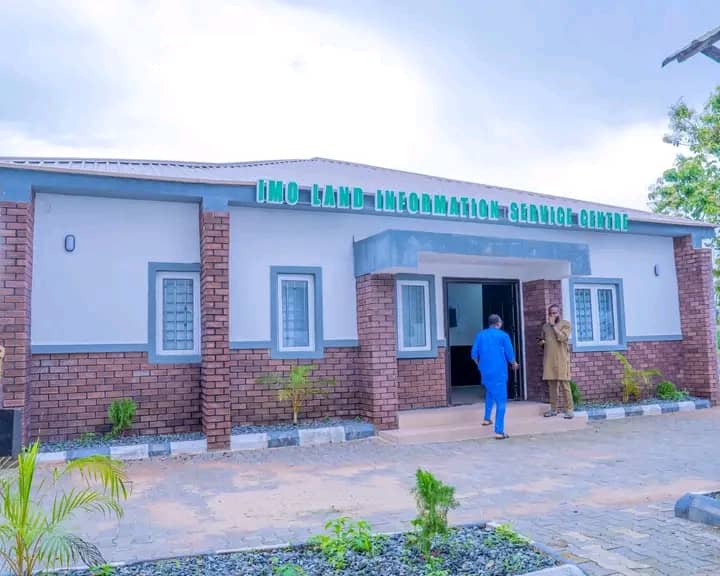A top secret lab is developing a super-precise ‘quantum clock’ that could revolutionize British intelligence.
This super-accurate timekeeping device, to be rolled out by 2029, will allow more precise navigation and surveillance on Royal Navy ships and RAF planes.
It will also ‘enhance the accuracy of advanced weapons’ like guided missiles and give British computer boffins the edge over online adversaries like cyber criminals.
It is the first device of its kind to be built in the UK and will be deployable on military operations in the next five years, according to Defence Science and Technology Laboratory (DSTL).
‘This first trial of advanced atomic clock represents a significant achievement in the UK’s quantum technology capabilities,’ said DSTL chief executive Paul Hollinshead.
‘The data gathered will not only shape future defence effort but is also a signal to industry and academia that we are serious about exploring quantum technologies for secure and resilient operational advantage.’
Quantum clocks use quantum mechanics – the physics of matter and energy at the atomic and subatomic scale – to keep time with unprecedented accuracy by measuring energy fluctuations within atoms.
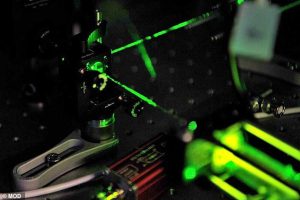
Developed at the top-secret Defence Science and Technology Laboratory, (Dstl) the quantum clock will improve British intelligence and surveillance by decreasing the reliance on GPS technology, which can be disrupted and blocked by adversaries

To be rolled out by 2029, the quantum clock will allow more precise navigation and surveillance on Royal Navy ships and RAF planes. Pictured, Royal Navy Duke class Type 23 anti-submarine frigate HMS Portland
Quantum clocks are even more accurate that the ‘atomic clocks’, of which there are approximately 400 already in operation around the world.
The UK already has an atomic clock at the National Physical Laboratory in London, but this quantum clock will be the country’s first.
Nick France, CTO of Sectigo, told MailOnline: ‘A quantum clock is a type of atomic clock – essentially a super-accurate timekeeping device.
‘Atomic clocks work by measuring the resonant frequency of atoms, whereas quantum clocks measure very small energy changes (‘quantum fluctuations’) in these atoms, leading to increased accuracy even over super-accurate atomic clocks.
‘Atomic clocks currently are incredibly accurate anyway, but a quantum clock has accuracy levels where only a single second is lost in billions of years of operation.’
The British quantum clock will be ‘the first device of its kind to be built in the UK’, said the UK government in a statement, but it will not be a world first.
Back in 2010, the University of Colorado at Boulder developed a quantum clock with the US National Institute of Standards and Technology.
However, key barriers to deploying quantum clocks are their size – current models come in a van or in a car trailer and are about 1,500 litres in volume.
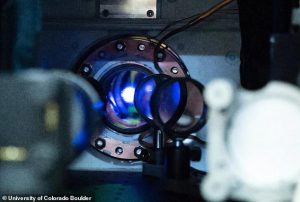
Atomic clocks use certain resonance frequencies of atoms to keep time with extreme accuracy. Pictured, atomic clock at the University of Colorado Boulder in the US
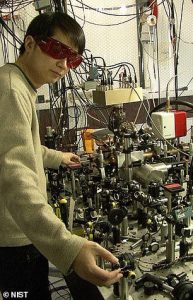
Back in 2010, the University of Colorado at Boulder developed a quantum clock with the US National Institute of Standards and Technology (pictured)
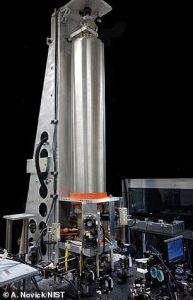
Pictured, NIST-F1, source of the official time of the USA
Potential of quantum clocks
- Enable more precise and independent navigation systems, reducing reliance on GPS satellites, which are vulnerable to jamming or destruction in conflict scenarios.
- Secure communications systems, such as encrypted military networks, which depend on highly synchronised timekeeping.
- Enhance the accuracy of advanced weapon systems, like guided missiles, which rely on accurate timing to calculate trajectories and coordinate attacks.
- Allow Armed Forces to gain an edge over adversaries in timing-critical operations, especially in areas like cyber warfare, where milliseconds can make a difference.
Source: DSTL
Just like most quantum equipment, quantum also have sensitivity to environmental factors such as heat and air molecules, limiting their transport between different places.
‘Quantum clocks are not small like watches or alarm clocks,’ France added.
‘These are devices that in current implementations can be large, even room-sized devices.
‘However, improvements in technology will decrease the size of these devices making them more portable.’
Apart from just ultra-precise timekeeping, quantum clocks could transform global navigation systems by helping satellite communications and aircraft navigation.
According to DSTL, their quantum clock will enable more precise and independent navigation systems, reducing reliance on GPS satellites, which are vulnerable to jamming or destruction in conflict scenarios.
It will improve communications systems, such as encrypted military networks, which depend on highly synchronised timekeeping, as well as boosting the accuracy of advanced weapon systems like guided missiles, which rely on accurate timing to calculate trajectories and coordinate attacks.
What’s more, British Armed Forces will get an edge over adversaries in ‘timing-critical operations’, such as cyber warfare, where milliseconds can make a difference.
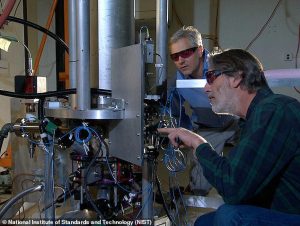
Coordinated Universal Time (UTC) is defined by sophisticated, ultra-precise ‘atomic clocks’ around the world, which tick precisely and continuously. Experts are pictured here with the NIST-F2 atomic clock in the US
Cyber warfare refers to the actions by a nation-state or international organization to attack and attempt to damage another nation’s computers or information networks.
France told MailOnline: ‘Super-accurate timekeeping is important to governments and militaries to enable accurate navigation (using GPS or similar technologies) of planes and ships, but also guidance of weapons systems such as missiles.
‘Equally important to the military as well as civilians is secure communications.
‘Much of the secure communications for governments and the military relies on accurate time sources to function.
‘But equally these accurate clocks are useful for more civilian applications and general internet security, even securing your personal data as it’s transmitted around the internet.’
Companies and governments around the world are keen to cash in on the huge potential benefits that the spooky effects of quantum technology could bring.
Google last month unveiled a new quantum computing chip it said could do in minutes what it would take leading supercomputers 10 septillion years to complete.
Eventually, such a chip could power a ‘commercial’ quantum computer that could be purchased by members of the public and used in labs, offices and even homes.
These ultra-powerful machines, which use the spooky effects of quantum physics, could do everything from speed up AI, solve climate changeand discover lifesaving drugs.
WHAT IS THE ATOMIC CLOCK?
Atomic clocks have a timekeeping mechanism that use the interaction of electromagnetic radiation with the excited states of certain atoms.
The devices are the most accurate system we have for measuring time, with consistent standards applied.
They are the primary standards for international time distribution services, and uses to control wave frequency for TV, GPS and other services.
The principle is founded in atomic physics, measuring the electromagnetic signal that electrons in atoms emit when they change energy levels.
Modern versions cool atoms to near absolute zero by slowing the atoms down with lasers. With temperature of atoms driving their accuracy.
Every few years a ‘leap second’ is added to atomic clocks, by effectively stopping them for a second, to keep them in line with Earth’s rotation speed.
Read more
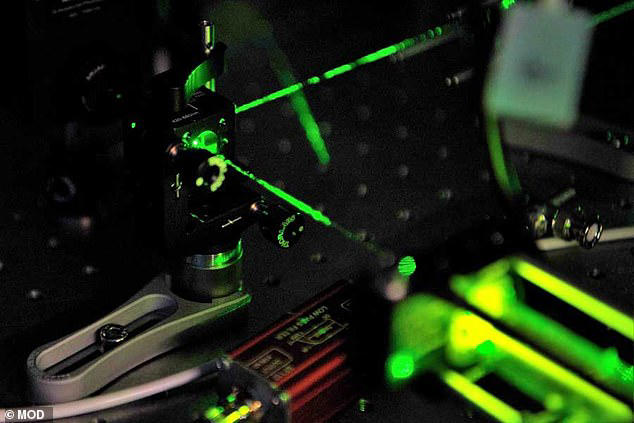
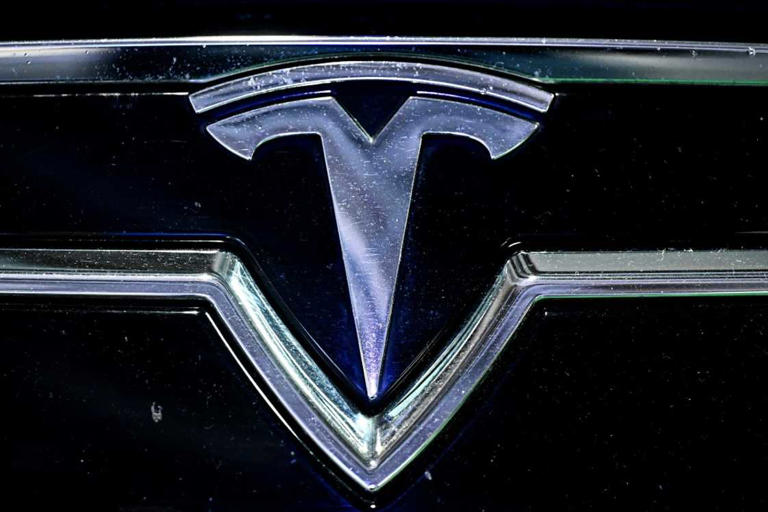

 Politics9 months ago
Politics9 months ago
 Trending9 months ago
Trending9 months ago
 Politics9 months ago
Politics9 months ago
 Politics9 months ago
Politics9 months ago


















